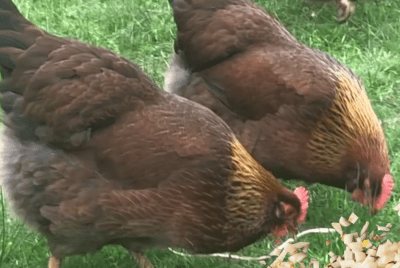Secure Your Chicken Coop From Raccoons And Foxes?
Chickens are a delightful addition to any backyard, providing fresh eggs and entertainment. However, the threat of raccoons and foxes can quickly turn that joy into a nightmare. To keep your feathered friends safe, it’s necessary to take the necessary precautions to secure their coop. From sturdy fencing to predator-proof locks, finding the best way to protect your chickens is crucial. Let’s explore the most effective methods to safeguard your coop and ensure the safety of your beloved birds.

Key Takeaways:
- Secure all entry points: Make sure your chicken coop has no gaps or holes that raccoons and foxes can squeeze through.
- Use sturdy hardware cloth: Choose a heavy-duty wire mesh to cover windows, vents, and doorways to prevent predators from breaking in.
- Install automatic door locks: Consider adding automated door locks that close at night to keep your chickens safe from nocturnal predators.
- Set up motion-activated lights or traps: Install lights or traps triggered by motion to deter raccoons and foxes from getting too close to the coop.
- Regularly check for signs of intrusion: Inspect the coop frequently for any signs of damage or attempted entry by predators, and reinforce security measures as needed.

Fortifying Your Coop
There’s nothing worse for a poultry owner than finding out predators have breached their coop and harmed their flock. Securing your chicken coop from raccoons and foxes is crucial to keeping your feathered friends safe. Here are some tips to fortify your coop and keep those pesky predators at bay.
Coop Design Essentials
Coop design is crucial when it comes to keeping raccoons and foxes out. Make sure your coop is sturdy with no weak points that predators can exploit. Install hardware cloth with a minimum of 19-gauge wire to prevent raccoons from reaching through and grabbing your chickens. Ensure that there are no gaps or holes larger than an inch in the coop structure.
Choosing the Right Materials
Right materials can make all the difference in securing your coop. When identifying materials, opt for rot-resistant wood such as cedar or pressure-treated lumber to prevent deterioration over time. Avoid using chicken wire as it is not strong enough to deter predators. Instead, invest in hardware cloth, which is more durable and predator-proof.
Coop Another option is to use metal roofing instead of traditional shingles, as it is harder for predators to break through. By choosing the right materials, you can significantly increase the security and longevity of your chicken coop.

Security Strategies
Deterrents and Repellents
With raccoons and foxes being notorious for their persistence in getting to chicken coops, it’s important to use deterrents and repellents to keep them at bay. Secure your coop perimeter with motion-activated lights, sprinklers, or ultrasonic devices to deter these nighttime predators. Additionally, use strong-smelling repellents like predator urine or ammonia-soaked rags around the coop to keep them away.
Proper Locking Mechanisms
Proper locking mechanisms are imperative to ensure the safety of your feathered friends. Invest in high-quality locks for doors and windows on your coop. Make sure to use heavy-duty padlocks or secure latches to prevent raccoons and foxes from prying them open. Consider adding locks to feed storage containers as well to prevent easy access to food sources.

Maintenance and Monitoring
Regular Inspections
Monitoring your chicken coop regularly is necessary in keeping raccoons and foxes at bay. Inspect the coop for any signs of damage or weak spots that predators could exploit. Look for holes, loose boards, or compromised wire mesh that could allow access to these cunning intruders. By catching and repairing issues early on, you can prevent potential attacks and keep your flock safe and secure.
Technology and Coop Monitoring
An effective way to enhance your coop security is by incorporating technology into your monitoring system. Installing cameras, motion sensors, or even an automated door can provide an extra layer of protection for your chickens. With real-time alerts and the ability to remotely monitor your coop, you can respond quickly to any threats and ensure the safety of your feathered friends.
By leveraging innovative technologies, you can gain peace of mind knowing that your chicken coop is secure from potential predators. Investing in these modern solutions can make a significant difference in safeguarding your flock and maintaining a safe environment for your chickens.

Conclusion on Secure Coop From Raccoons and Foxes
Upon reflecting on the various methods to secure your chicken coop from raccoons and foxes, it is evident that a combination of physical barriers, like hardware cloth and electric fencing, along with secure locking mechanisms and predator-proofing measures, such as predator lights and guard animals, offer the best protection. By implementing these strategies, you can ensure the safety and well-being of your feathered friends while keeping unwanted guests at bay. Keep in mind, the key is to be proactive and diligent in maintaining the security of your chicken coop to prevent any potential threats.
FAQ’s about Secure Coop From Raccoons and Foxes
Q: How can I secure my chicken coop from raccoons and foxes?
A: To secure your chicken coop from raccoons and foxes, make sure to use hardware cloth with a small mesh size, secure all openings with locks and latches, and install motion-activated lights or sound devices as a deterrent.

Q: What is hardware cloth and why is it important for securing a chicken coop?
A: Hardware cloth is a sturdy wire mesh with a small grid pattern that is imperative for protecting your chickens from predators like raccoons and foxes. It is important because it is more durable and secure than chicken wire, which can be easily chewed through.
Q: How can I reinforce the doors and windows of my chicken coop?
A: To reinforce the doors and windows of your chicken coop, use heavy-duty locks, latches, and hinges that cannot be easily manipulated by predators. Make sure there are no gaps or openings where raccoons or foxes can squeeze through.
Q: Are there any natural deterrents I can use to keep raccoons and foxes away from my chicken coop?
A: Yes, you can use natural deterrents like predator urine, such as fox or coyote urine, around the perimeter of your chicken coop to discourage raccoons and foxes from approaching. Planting strong-smelling herbs like lavender or rosemary can also help repel predators.
Q: How can I make my chicken coop less attractive to raccoons and foxes?
A: To make your chicken coop less attractive to raccoons and foxes, make sure to remove any food sources like spilled grain or leftover treats, keep the coop clean and well-maintained, and avoid leaving out any garbage or compost that may attract predators. Regularly inspecting your coop for any potential entry points and reinforcing them as needed will also help deter unwanted visitors.
Are Cream Legbar CHickens The Answer to your Blue Egg Dreams?
Do Buff Brahma CHickens Make Excellent Backyard Pets?
How Do Black Copper Maran Chickens Differ From Regular Marans?
Can Rare Biekefekder Chickens Survive In Cold Climates?
How many Eggs Do Golden Comet Chickens Lay in a Week?
Small American Farmers in Serious Crisis – The Back Story













